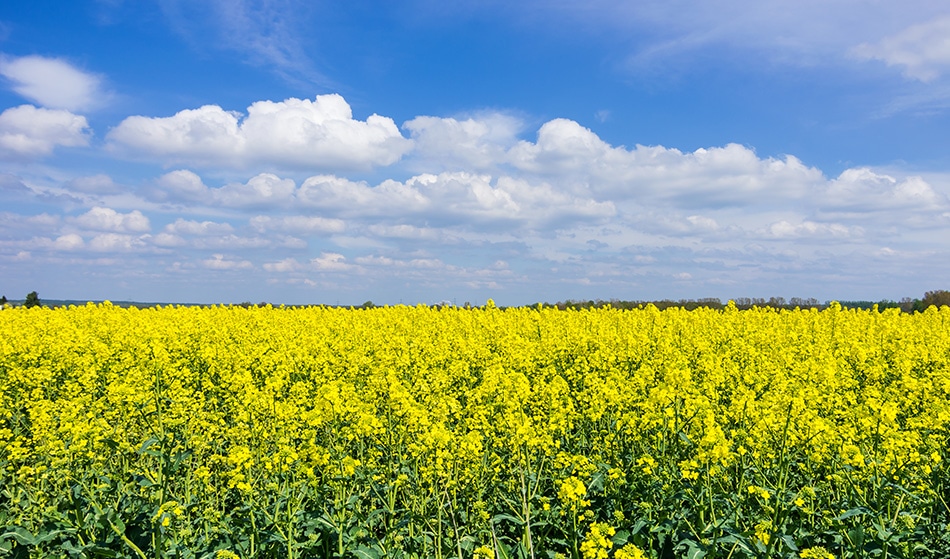-2.jpg) By Thomas HornigoldFeb 15 2018
By Thomas HornigoldFeb 15 2018Even if we can fulfill the goals of the Paris Agreement and keep global mean temperature rise to within 2K, it will still mean that much of the world’s fertile agricultural land is exposed to unprecedented high temperatures. Various studies have suggested that as the global mean temperature warms, crop yields decrease by significant amounts, it may well prove crucial as the population grows to expand the range of temperatures that crops can endure.
 UllrichG/shutterstock
UllrichG/shutterstock
Now, a new study from the John Innes Centre suggests that it may – in principle – be possible to breed some of the most vulnerable crops to become more resilient to rising temperatures.
Oilseed rape may be a significant crop of the future: not only is it currently an abundant source of vegetable oil, but it’s also the basis of a successful biofuel. Given that many climate scenarios involve large amounts of bioenergy with carbon capture and storage – a technology that has the potential to be carbon-negative rather than just carbon-neutral, oilseed rape will only grow more attractive to farm in the future. But it suffers from “pod shatter,” where the seeds of the plant are prematurely dispersed – this accounts for 15-20% of lost annual yield for farmers. What’s worse, pod shatter is enhanced at higher temperatures, and this effect is seen across a wide range of similar plants such as cauliflower, broccoli, and kale.
The new study establishes a genetic link between increased temperature and increasing pod shatter.
It's almost as if there is a thermostat that controls seed dispersal or pod shatter. As we learn how it works, we could in the future 'rewire' it, so seed dispersal does not happen at the same pace at higher temperatures. This piece of the puzzle, coupled with the use of advanced genetic tools means that developing temperature-resilient crops becomes an achievable dream.
Dr. Vinod Kumar, Co-Author
This paper, published in Molecular Plant, establishes that there are genetic pathways which control the sensitivity to temperature in the Brassicaceae family, which includes oilseed rape. A greater understanding of the temperature-sensing mechanism could lead to plants being bred that are less sensitive to higher temperatures in the future.
The experiment was conducted by a postdoctoral researcher, Dr. Xinran Li, who studied a model plant – Arabidopsis, sometimes known as rock cress or thale cress. This plant is of special interest as it was the first to have its entire genome sequenced, in 2000. Its small genome, short lifespan, and small size means that it is often used for studies of plant genetics and plant biology – and this model plant is closely related to the crops of the Brassicaceae family. The study exposed Arabidopsis to temperatures of 17, 22, and 27 degrees centigrade, and monitored the development of its fruit.
The researchers determined that the cell wall for the plant stiffens at increasing temperatures at the location where pod shatter takes place; this stiffening is enhanced at higher temperatures. Across the Brassicaceae family, this effect leads to an acceleration of the unwanted seed dispersal. Previous studies demonstrate that pod shatter is controlled by a gene called INDEHISCENT (IND). This study reveals that IND is under the control of the plant’s thermosensory mechanism, in which a histone – the proteins that package DNA and order it into nucleosomes - called H2A.Z is important.
The report concludes: "Our findings introduce an environmental factor to the current knowledge, which provide alternative avenues for crop improvement in the face of climate change."
As biotechnology improves, and with CRISPR-Cas9 promising the ability to edit genomes with greater ease than ever before, it seems likely that soon researchers may attempt to engineer plant genomes to make them less sensitive to increasing temperatures. There are many difficulties faced by the agricultural community, including the scourges of topsoil erosion and desertification that are exacerbated by short-sighted human practices and climate change; these processes serve to decrease the amount of arable land available. Combine this with a warming world and an ever-increasing population, keeping yields high will be crucial – and the farmers of the future will rely on the research breakthroughs of today to do it.
Disclaimer: The views expressed here are those of the author expressed in their private capacity and do not necessarily represent the views of AZoM.com Limited T/A AZoNetwork the owner and operator of this website. This disclaimer forms part of the Terms and conditions of use of this website.